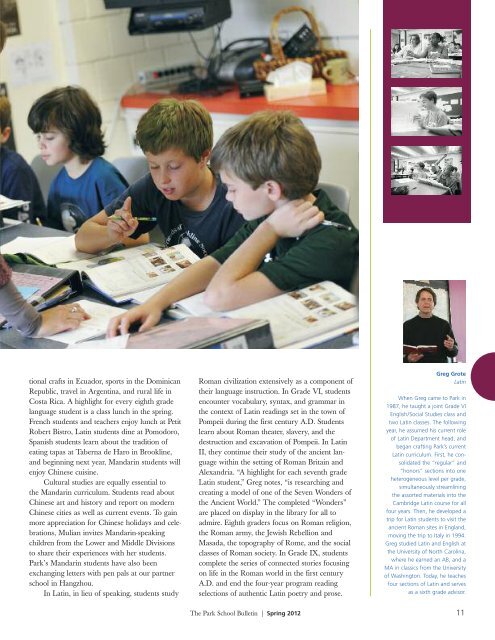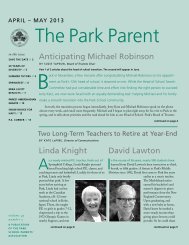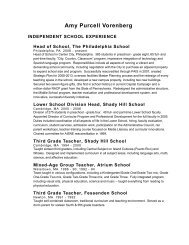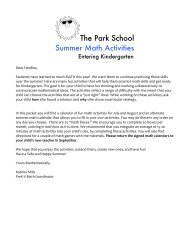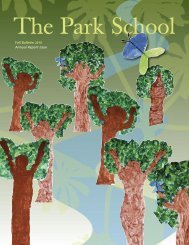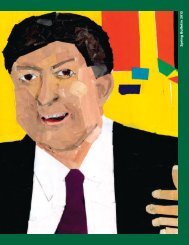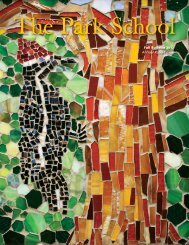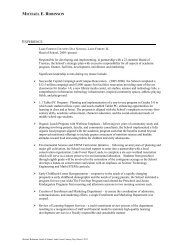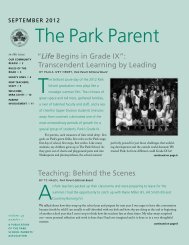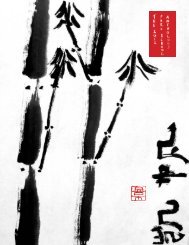Spring Bulletin 2012 - The Park School
Spring Bulletin 2012 - The Park School
Spring Bulletin 2012 - The Park School
Create successful ePaper yourself
Turn your PDF publications into a flip-book with our unique Google optimized e-Paper software.
tional crafts in Ecuador, sports in the Dominican<br />
Republic, travel in Argentina, and rural life in<br />
Costa Rica. A highlight for every eighth grade<br />
language student is a class lunch in the spring.<br />
French students and teachers enjoy lunch at Petit<br />
Robert Bistro, Latin students dine at Pomodoro,<br />
Spanish students learn about the tradition of<br />
eating tapas at Taberna de Haro in Brookline,<br />
and beginning next year, Mandarin students will<br />
enjoy Chinese cuisine.<br />
Cultural studies are equally essential to<br />
the Mandarin curriculum. Students read about<br />
Chinese art and history and report on modern<br />
Chinese cities as well as current events. To gain<br />
more appreciation for Chinese holidays and celebrations,<br />
Mulian invites Mandarin-speaking<br />
children from the Lower and Middle Divisions<br />
to share their experiences with her students.<br />
<strong>Park</strong>’s Mandarin students have also been<br />
exchanging letters with pen pals at our partner<br />
school in Hangzhou.<br />
In Latin, in lieu of speaking, students study<br />
Roman civilization extensively as a component of<br />
their language instruction. In Grade VI, students<br />
encounter vocabulary, syntax, and grammar in<br />
the context of Latin readings set in the town of<br />
Pompeii during the first century A.D. Students<br />
learn about Roman theater, slavery, and the<br />
destruction and excavation of Pompeii. In Latin<br />
II, they continue their study of the ancient language<br />
within the setting of Roman Britain and<br />
Alexandria. “A highlight for each seventh grade<br />
Latin student,” Greg notes, “is researching and<br />
creating a model of one of the Seven Wonders of<br />
the Ancient World.” <strong>The</strong> completed “Wonders”<br />
are placed on display in the library for all to<br />
admire. Eighth graders focus on Roman religion,<br />
the Roman army, the Jewish Rebellion and<br />
Masada, the topography of Rome, and the social<br />
classes of Roman society. In Grade IX, students<br />
complete the series of connected stories focusing<br />
on life in the Roman world in the first century<br />
A.D. and end the four-year program reading<br />
selections of authentic Latin poetry and prose.<br />
Greg Grote<br />
Latin<br />
When Greg came to <strong>Park</strong> in<br />
1987, he taught a joint Grade VI<br />
English/Social Studies class and<br />
two Latin classes. <strong>The</strong> following<br />
year, he assumed his current role<br />
of Latin Department head, and<br />
began crafting <strong>Park</strong>’s current<br />
Latin curriculum. First, he consolidated<br />
the “regular” and<br />
“honors” sections into one<br />
heterogeneous level per grade,<br />
simultaneously streamlining<br />
the assorted materials into the<br />
Cambridge Latin course for all<br />
four years. <strong>The</strong>n, he developed a<br />
trip for Latin students to visit the<br />
ancient Roman sites in England,<br />
moving the trip to Italy in 1994.<br />
Greg studied Latin and English at<br />
the University of North Carolina,<br />
where he earned an AB, and a<br />
MA in classics from the University<br />
of Washington. Today, he teaches<br />
four sections of Latin and serves<br />
as a sixth grade advisor.<br />
<strong>The</strong> <strong>Park</strong> <strong>School</strong> <strong>Bulletin</strong> | <strong>Spring</strong> <strong>2012</strong> 11


